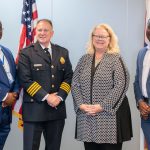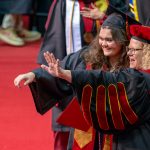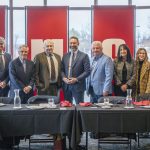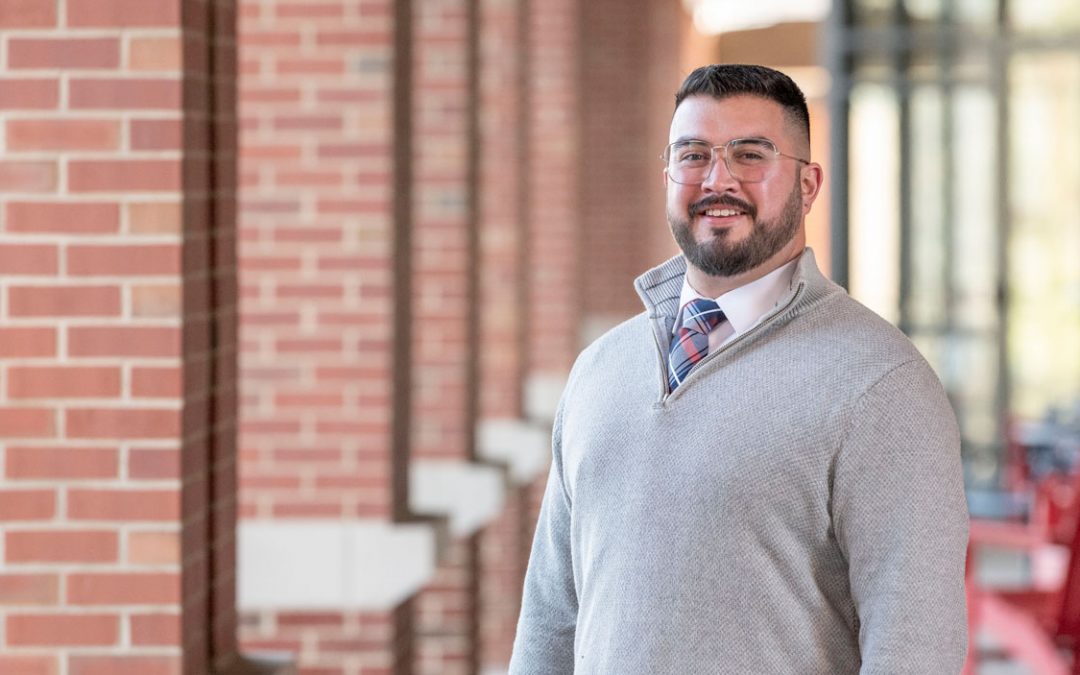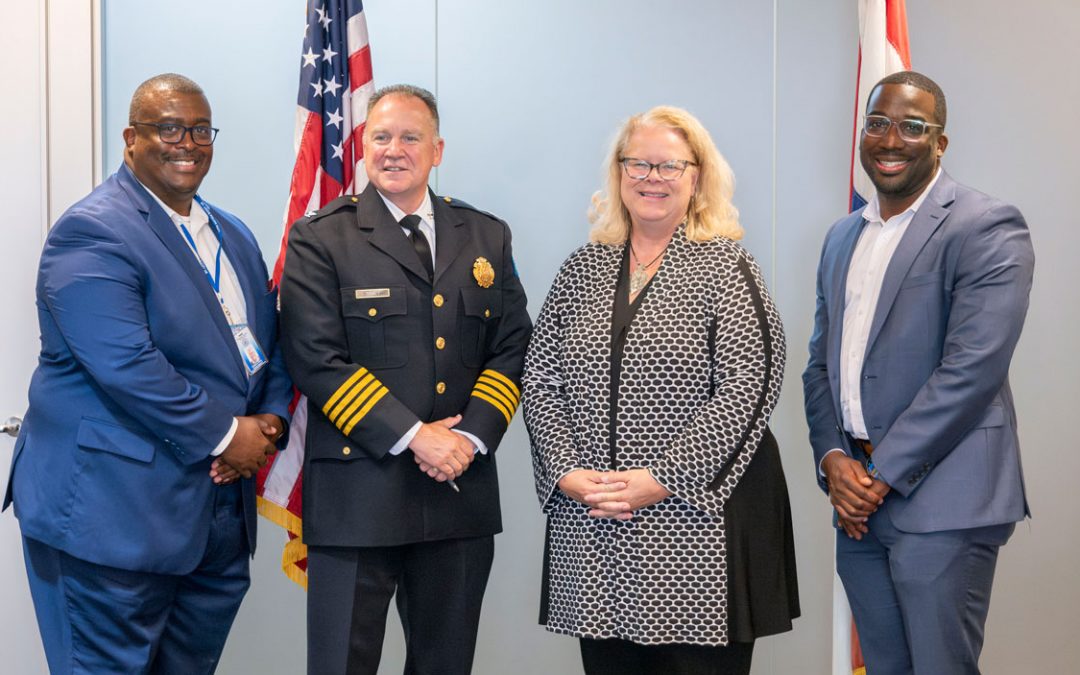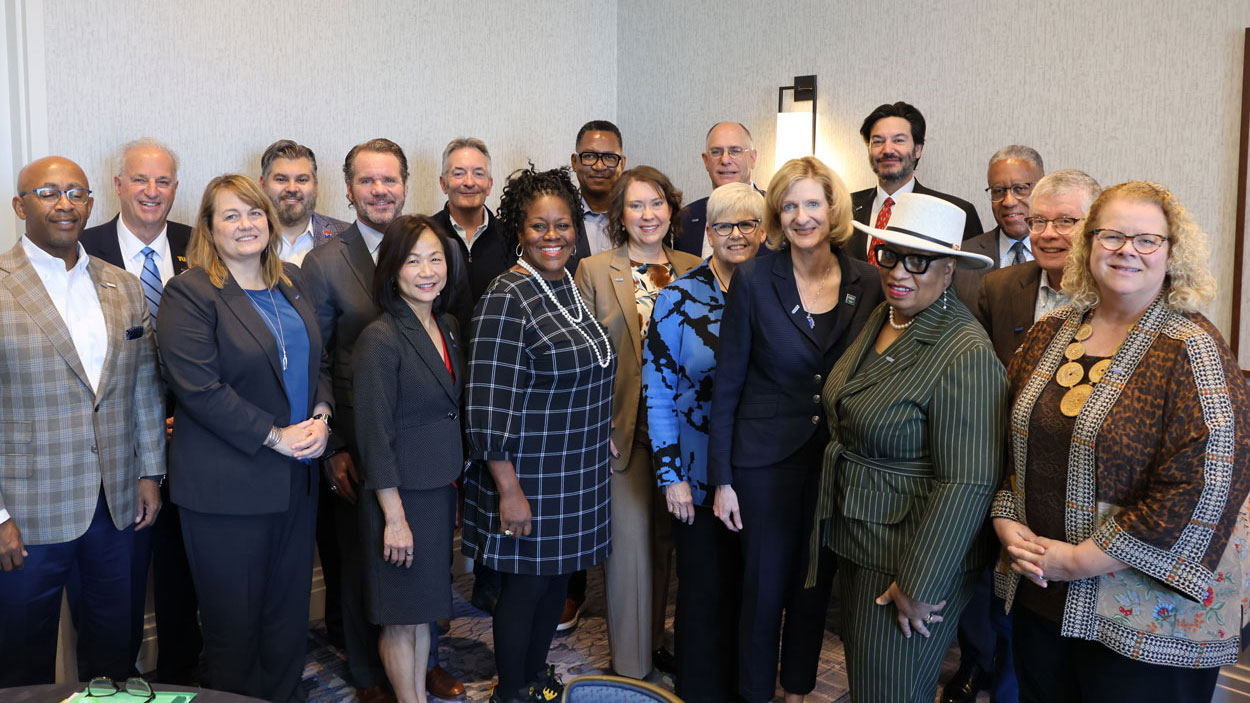
Chancellor Kristin Sobolik (far right) poses with the current CUMU Board of Directors during the organization’s annual conference. Sobolik served as chair of the CUMU Board of Directors from 2023 to 2025 and now holds the role of Immediate Past President. (Photos courtesy of CUMU)
The University of Missouri–St. Louis once again made a significant impact at the Coalition of Urban and Metropolitan Universities Annual Conference, where faculty, staff and administrators gathered to share insights, strategies and innovations in service to urban communities.
This year, UMSL’s contributions were especially visible through a series of presentations and leadership roles that underscored the university’s deep commitment to community engagement, communication and collaboration.
Among UMSL’s participants was Justin L. Roberts, vice chancellor for marketing and communications, who led a 90-minute in-person session as part of CUMU’s yearlong Strategic Communications Huddle. The session, titled “Empowering Others to Share Your Impact,” marked the culmination of a six-part Huddle series that Roberts facilitated over the past year. Huddles are informal, discussion-based learning communities designed to create space for participants to reflect on key topics while building new relationships across institutions.
Roberts, who also participated in a panel discussion to kick off the conference, shared insights into what inspired him to lead the Huddle series.
“At the first CUMU conference I attended, I was struck by the incredible work happening across our institutions,” Roberts said. “But I also noticed very few professionals from marketing or communications in the room. I saw an opportunity to bridge that gap – to create space for conversations about how we communicate our impact more effectively.”
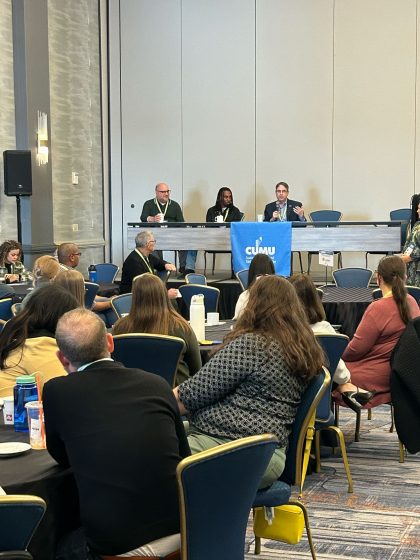
Justin L. Roberts, UMSL’s vice chancellor for marketing and communications, led a 90-minute in-person session as part of CUMU’s yearlong Strategic Communications Huddle.
The Huddle series focused on aligning communication strategies with institutional priorities, building internal storytelling partnerships, engaging media and external audiences with intentionality, and navigating when to speak – and when to pause – during moments of public pressure or crisis.
“What is great about hosting a Huddle is that you don’t have to have all the answers,” Roberts said. “What you need is a question worth exploring and a willingness to create space for others to weigh in. For me, it’s been an incredible way to grow, build relationships across institutions, and expand the way I think about the work we do in urban and metropolitan universities.”
Several additional UMSL colleagues presented throughout the conference on topics that reflected UMSL’s anchor mission and collaborative approach within the communities it serves.
Stefani Weeden-Smith, director of the St. Louis Anchor Action Network, led a pre-conference workshop titled “Building Your Regional Anchor Collaborative,” which guided participants through frameworks and strategies to launch or strengthen regional anchor coalitions. The hands-on session helped university, health care and civic leaders chart paths for deeper local impact through formal collaboration.
Natalie Bolton, an associate professor in the College of Education, led a presentation titled “Translational Research in K-12 Schools: Postdoctoral Fellows in Bridging Research and Practice.” Her session explored the powerful role of embedding researchers in local schools to strengthen the connection between educational theory and classroom application. Bolton shared case studies demonstrating how translational research initiatives can enhance instructional strategies, support teacher development and ultimately improve student engagement and outcomes.
Pallavi Aggarwal, a postdoctoral fellow in the College of Education, partnered with Bolton for a poster session titled “Bridging the Gap Between Research and Practice.” The poster highlighted the work of the UMSL Charter School Translational Fellowship program and its collaboration with a local K-5 urban charter school. The presentation showcased evidence-based tools, systemic instructional improvements and strategies to refine classroom management and social-emotional learning practices.
Jermecia Jackson, program manager for the St. Louis Anchor Action Network, contributed a separate poster session titled “Overlooked Barriers: Challenges Faced by Early Professionals and the Employers Seeking Retention,” which explored how early career barriers influence employment stability and the strategies employers and community partners can use to promote economic mobility.
UMSL’s presence at the 2025 conference reflected not only the university’s strategic priorities but also its ongoing commitment to national leadership in the metropolitan university movement – carried forward by faculty, staff and Chancellor Kristin Sobolik, who previously served as chair of the CUMU Board of Directors from 2023 to 2025 and now holds the role of immediate past chair.
“UMSL’s role in CUMU isn’t just about showing up – it’s about shaping the conversation,” Sobolik said. “Whether it’s anchor collaborations, translational research or communication strategy, we’re helping define what it means to serve urban communities with intention and impact.”





